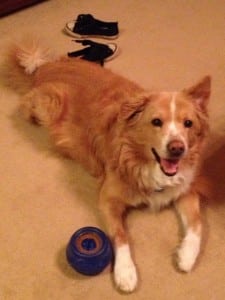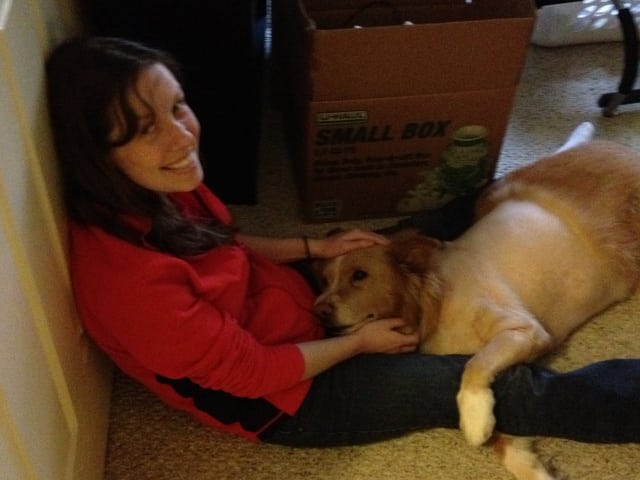The idea of amputating a dog or cat’s leg is terrifying for humans, but Dr. Cyndie Courtney, DVM of Vet Changes World, is a veterinarian on a mission to take the fear out of making medical decisions for our pets.
Dr. Courtney works every day to make a difference in the lives of pets and the people who love them. She is especially interested in how veterinarians and pet owners can work together to make pet healthcare decisions. She will be our special guest this Saturday on Tripawd Talk Radio and will share her decision-making strategies for pet parents. You’ll also learn how she had to decide if amputation was best for her dog Riley after he was diagnosed with mast cell cancer.
 This episode is now live. Listen here now.
This episode is now live. Listen here now.
The following guest blog post about Riley’s diagnosis was written from the heart by Dr. Courtney. We hope you enjoy it and will join us this Saturday on Tripawd Talk Radio!

How To Make Terrifying Medical Decisions for Your Pet
Words like “cancer” and “amputation” turn our minds into goo, bringing even the smartest of us to our knees.
I should know. We’d had Riley 2 months when we found a cancerous Mast Cell Tumor on his left elbow.
You’d think that as a veterinarian, I could handle that situation better than most.
Unfortunately, it just meant I knew all the worst-case scenarios intimately.
Human oncologists know that many of their cancer patients go on to live perfectly healthy normal lives. But I bet you their heart still plummets if their kid is diagnosed with a melanoma.
As a vet I had seen plenty of Tripawds live full and happy lives, but I was terrified of what it would mean for my Riley to live without one of his legs.
I was equally scared that my emotions would get in the way of doing the right thing for Riley, that I would “wimp out” and not amputate his leg even if it was what he needed.
Despite all my medical education, this decision paralyzed me.
There’s a scientific reason for why your head feels full of cotton when you’re scared.
Your flight or flight instincts turn on and rational decision-making turns off.
As described in the book “The Willpower Instinct” by Kelly McGonigal, when you experience stress, your body diverts resources away your prefrontal cortex, the part of your brain responsible for transforming data and emotions into rational decisions. Instead, it ramps up the adrenaline that fuels your unconscious survival instincts.
When you’re scared you also get tunnel vision and your ability to process information crashes.
“How We Decide,” by Jonah Lehrer describes how our mind gathers information when we’re scared. If you take normal people and give them a visual field test in a under stress, they can see what’s directly in front of them just fine, but their peripheral vision is shot to hell. We just can’t absorb the same amount of information when we’re scared.
How to Decide on Veterinary Treatments
So what do we do? We have to make decisions that scare us all the time. Here’s how:
First, buy yourself time.
Fear and stress generally diminish the longer you sit with a decision. Time allows your prefrontal cortex to start working again.
Depending on the situation, your vet can usually give you a couple minutes, days, or weeks to consider your options. Give yourself a deadline so you can’t just avoid making the decision altogether.
Riley’s oncologist gave me about a week to talk with my family and decide what to do next.
Second, find some perspective.
In their book Decisive, Chip and Dan Heath recommend zooming out and zooming in on decisions to help you see the full picture.
Zoom out by getting as much generalized numerical data as you can. Your vet, oncologist, or surgeon is your best resource.
Some reliable information can also be found online at websites like:
Then, check those online insights with your vet, who can put that information into the context of your pet’s unique situation. This data can help you see your pet’s chances more objectively.
Finally, zoom in by learning about the nitty gritty, real life consequences of deciding one way or the other. Talk with pet owners who have gone down the roads you’re contemplating. The Tripawds website and their book “Three Legs and a Spare” is a great way to do this if you are considering an amputation for your pet.
To Amputate or Not?
With Riley, I sat down with his surgeon and oncologist to discuss his options. It turned out we had a good chance of saving his leg using a skin graft procedure. However, if the graft failed, we might still have to amputate. Talking with others who had the graft procedure, their pets did well. However, it would be much more expensive.
Ultimately we decided to have a lean Christmas that year and go for the graft, realizing we might have to amputate later.

I realized that choosing the graft instead of amputation wasn’t “wussing out,” it was the right decision for Riley. Riley never became a tripawd, his graft healed well, and his mast cell tumor never returned.
Taking a step back helped us make a decision based on good information, not on fear.
So, when you find yourself making a medical decision in a fog of fear remember
- buy time
- find perspective to help you find the path forward.
The only wrong decision is letting fear make the decision for you.
Learn more about how to make veterinary decisions for your pet with Dr. Courtney, this Saturday on Tripawd Talk Radio!



2 thoughts on “How to Make Good Medical Decisions for Your Pets on Tripawd Talk Radio”